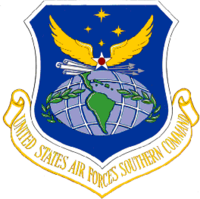Caribbean Air Force
| United States Air Forces Southern Command | |
|---|---|

USAF Southern Command emblem
|
|
| Active | 1940–1976 |
| Country |
|
| Branch |
|
| Type | Major Command |
| Garrison/HQ | Howard Air Force Base, Panama |
| Engagements | |
| Commanders | |
| Notable commanders |
Hubert R. Harmon |
The United States Air Forces Southern Command is an inactive Major Command of the United States Air Force. It was headquartered at Albrook Air Force Base, Canal Zone, being inactivated on 1 January 1976.
Formerly designated as Sixth Air Force, the command's mission was the defense of the Panama Canal and for USAF relations, including foreign military sales (FMS) and disaster relief assistance, with the Latin American nations. The command supported disaster relief to countries such as Guatemala, Jamaica, Nicaragua, the Dominican Republic, Panama and Colombia. It also assisted nations in Central and South America in purchases of United States military aircraft and trained their technicians in logistics and maintenance for the aircraft.
The first United States air units arrived in the Canal Zone in February 1917, with the 7th Aero Squadron being organized on 29 March at Ancon. It was equipped with Curtiss JN-4 "Jennys" and Curtiss R-3 and R-4 floatplanes.
The squadron initially came under the control of Headquarters, U.S. Troops, Panama Canal Zone, and beginning on 1 July 1917, Army aviation units were assigned directly to the Panama Canal Department, which was the senior United States Army headquarters in the Canal Zone. During World War I, the 7th Aero was assigned to patrol for German U-Boats offshore of the Canal Zone under direction of Coast Defenses of Cristobal, from 1 June – 15 November 1918.
The 7th Aero Squadron was assigned to several fields during 1917 and 1918, those being Corozal (16 April); Empire (May); Fort Sherman (29 August); Cristobal (March 1918) before finding a permanent home at Coco Walk, which became France Field in May 1918.
...
Wikipedia
